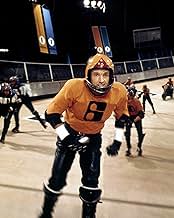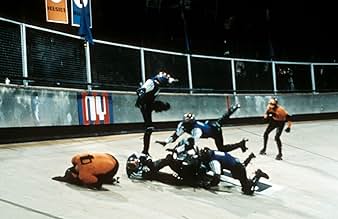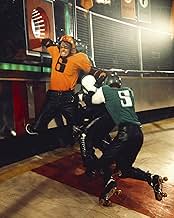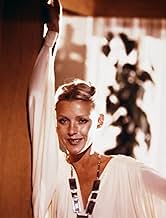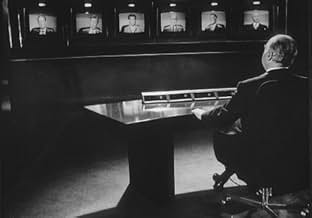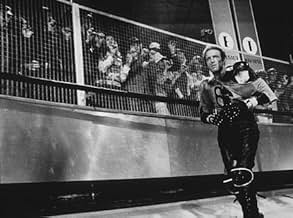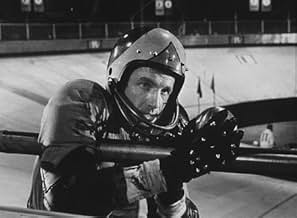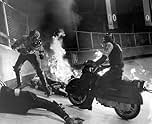Rollerbar è ambientato nel secolo prossimo quando sei mega corporazioni governano l'intera economia mondiale ed elaborano un gioco brutale e sanguinario per farvi sfogare l'aggressività insi... Leggi tuttoRollerbar è ambientato nel secolo prossimo quando sei mega corporazioni governano l'intera economia mondiale ed elaborano un gioco brutale e sanguinario per farvi sfogare l'aggressività insita nell'uomo.Rollerbar è ambientato nel secolo prossimo quando sei mega corporazioni governano l'intera economia mondiale ed elaborano un gioco brutale e sanguinario per farvi sfogare l'aggressività insita nell'uomo.
- Ha vinto 1 BAFTA Award
- 4 vittorie e 5 candidature totali
- Bartholomew's Aide
- (as Rick Le Parmentier)
- Madrid Biker #1
- (non citato nei titoli originali)
- Houston Team Rookie
- (non citato nei titoli originali)
- Biker
- (non citato nei titoli originali)
Recensioni in evidenza
James Caan is fantastic as Johnathan E, the Michael Jordan of Rollerball. He continues to succeed in a sport designed to show the futility of individual effort. The sport is constantly changed to stop him, yet he continues to overcome every obstacle.
John Housman is electrifying as the head of the Energy Corporation, owners of the Houston Team. He has conspired with his peers to keep the masses down and use this sport to both distract them and show them that the individual can't succeed. He grows more desperate as Johnathan E defeats his schemes. He tries every trick without success.
The supporting cast is filled with great actors, like Moses Gunn, John Beck, Sir Ralph Richardson (not John Gielgud, as one reviewer stated), Maude Adams, and Shane Rimmer.
The film demonstrates that the individual can triumph over insurmountable odds and cautions against corporate control of society. It uses both allegory and speculation beautifully, and packages it with thrilling action. The remake was destined for failure because it couldn't see beyond the action. The action was only window dressing for the greater themes. If only more recent sci-fi films were this thought-provoking, or other films for that matter.
Now, having just watched the movie twice in a night, the second time with the director's commentary, I have finally got to grips with the scenes between the action, and discovered that I like it more than ever. The view of the future is not highly original; tipping its hat to the stratified societies foreseen by Orwell and Huxley, amongst others; but nevertheless the portrayal is engaging. Jewison astutely realised that only by filling in the image of the future society, the characters, and the political background against which the tournament unfolds, would the game be seen as truly REAL for the characters. In the meanwhile, he also has the chance to build suspense, upping the stakes for both the heroic gladiator/combateur Jonathon, and his would-be puppet master Bartholemew. In this way, when we come to watch the actual contests, our enthusiasm is whetted, and by making the rules progressively more dangerous with each passing game, the stakes grow ever higher.
The central themes of the movie are (i) loss-of-soul/nihilism/sensual-vs-spiritual-happiness, and (ii) individuality vs state control. Perhaps the best scenes elucidating these themes are the famous `tree killing' scene, and the conversation between Jonathon and Ella in the forest. The use of imagery and metaphor is widespread; I will mention only the terrific concept of the roulette wheel as game arena, with the players INSIDE, instead of outside; and the Circus Maximus parallel. You may draw many interesting conclusions from this about the director's and writer's intent.
My final word is: watch it once, soak up the action, and be bored by the rest. Then view it again, feel yourself in Jonathon's dilemma, experience his wrenching disappointment with the people in his life who betray him, and try to tear yourself away if you can as he is pushed inexorably to his fate in the arena of ROLLERBALL.
My opinion of 'Rollerball' is that it is a flawed film but also a very impressive one. The momentum does sag, particularly in the middle, in some scenes not on the arena. Bogged down by a little too much extraneous talk, like the Ella story line, and a few ideas that could have gone into more depth. Of the characters, the only ones that are really developed like "real" characters are Jonathan E and Bartholomew (Ella particularly is a cipher), and parts while well intended are laid on too thick somewhat.
However, 'Rollerball' is well made visually. It's all very slick and stylish and the set for the rollerball arena still makes one go wow. Liked the look of the future dystopia, not extraordinary but it was atmospheric. Jewison directs with assurance, while the script has a lot of intelligent and thought-provoking lines and ideas that resonate a lot and still are very much relevant. The message is much appreciated and is very much pertinent.
Story is intriguing and has enough to compel, and Jonathan E and Bartholomew are very interesting characters. The supporting cast, particularly John Beck, are solid.
'Rollerball' excels particularly in four particularly strongly done areas. The tautly filmed and edited rollerball sequences are incredibly exciting and have a real sense of disturbing danger and nerve-shredding tension too. Andre Previn does well with the music score, but shining even more is to me some of the best use of classical music on film, including the most beautiful use of Albinoni's Adagio ('Manchester By the Sea' also used it beautifully but it's done more subtly here), Bach's Toccata used very creepily and the best use of Shostakovich on film. It's not just that the music itself is wonderful but also that they are so cleverly used, almost ironically and also unnervingly.
James Caan is a highly charismatic lead and gives the character nuances, while John Houseman's Bartholomew is chilling. One cannot review 'Rollerball' without mentioning the incredibly powerful ending either.
Overall, very impressive but flawed. 7/10 Bethany Cox
But in both films, we see the same powerful strategy: a complex, philosophical brain-twister beneath a deceptivly simple exterior. "Fiddler on the Roof" was seemingly a linear story about a struggling Jewish family's good & bad times. But the real meat of the story was about the conflict between old ways and new (tradition vs. progress). Here in "Rollerball" we have another seemingly linear story about an athlete in a violent, futuristic sport. But the real meat is the conflict of brutal human nature vs. suppression (again, a sort of "tradition vs. progress"). As with "Fiddler on the Roof", director Norm Jewison doesn't hit us over the head with any preachy sermon but instead leaves us to digest the situation.
"Rollerball" has the same powerful, brooding quality that we see in many of the 70s scifi masterpieces, like "THX 1138", "Soylent Green", "Planet of the Apes", "Blade Runner" (yeah I know that one was 1982), and the one that started them all, "2001: A Space Odyssey". Cold, sterile sets, disturbing situations and powerful use of silence characterize these films. By today's standards they might be considered slow, but depending on how you like your scifi, that might be right up your alley.
In a nutshell, the story is about a futuristic society that has largely done away with civilian violence. It has done this by "subsidizing" violence by way of a global pasttime: a hyper-violent sport called Rollerball. Note: as a parallel story, we learn that cut-throat corporate competition has been similarly squelched by the government creating monopolies. And thus society finds peace. Or does it? You can probably see the brilliant metaphors being woven here. This isn't an ordinary scifi romp, it's a powerful socio-political allegory. It cuts to the heart of human nature the way the great writers H.G. Welles, Mary Shelley and George Orwell did. No, you won't see a lot of laser battles, spaceships and aliens. But here you'll see an excellent example of what scifi was designed to do: comment on our current human condition by creating a fictional (extreme) scenario as a cautionary tale.
Excellent, and I mean EXCELLENT performances by James Caan (The Godfather, Misery), John Houseman (The Paper Chase, The Fog), Maud Adams (3 James Bond films), Moses Gunn (every 70s TV show from Hawaii 5-O to Shaft), and a particularly gripping performance by Pamela Hensley (Princess Ardala in "Buck Rogers" homina homina) make this an all-star powerhouse of 70s talent.
The music deserves a special mention of its own. From the opening notes of Bach's Toccata in Dm (the creepy "Dracula" theme) to Albinoni's haunting Adagio in Gm (check it out on YouTube... saddest song ever), "Rollerball" doesn't hold back.
They don't make 'em like this anymore. But there are a few modern scifi films that come close: "Moon", "District 9" and "Solaris" come to mind.
If you liked the films I mentioned in this review; if you liked the 70s classics "Catch-22" and "Coma" and "Stepford Wives"; if you like films that are both entertaining and works of art, do NOT miss Rollerball.
For laughs, after you watch Rollerball (1976), check out the remake done in 2002 ...and see how far we've come :/
Lo sapevi?
- QuizMany of the extras in the film received an additional wage in order to cut their fashionably long hair so the look of the film would not be tied to the era in which it was made.
- BlooperAt the beginning of the New York game, after many moments in the film where different characters have repeated that there would have been "no time limit", the scoreboard shows the countdown (starting from 20.00).
This is not actually a goof, as the game was still going to have 20-minute periods, but there was going to be no limit to the number of periods, hence "no time limit".
- Citazioni
Bartholomew: Sweet dreams, Moonpie. That's a bad habit you've got there. You know what that habit will make you dream, Moonpie? You'll dream you're an executive. You'll have your hands on all the controls, and you will wear a gray suit, and you will make decisions. But you know what, Moonpie? You know what those executives dream about out there behind their desks? They dream they're great Rollerballers. They dream they're Jonathan; they have muscles, they bash in faces.
- ConnessioniFeatured in Brubaker (1980)
- Colonne sonoreToccata and Fugue in D minor, BWV 565
(uncredited)
Composed by Johann Sebastian Bach
Performed by Simon Preston and the London Symphony Orchestra
Conducted by André Previn
I più visti
Dettagli
- Data di uscita
- Paesi di origine
- Lingua
- Celebre anche come
- Rollerball: los gladiadores del futuro
- Luoghi delle riprese
- BMW Building, Monaco, Baviera, Germania(Energy Corporation headquarters)
- Aziende produttrici
- Vedi altri crediti dell’azienda su IMDbPro
Botteghino
- Budget
- 6.000.000 USD (previsto)
- Tempo di esecuzione2 ore 5 minuti
- Colore
- Mix di suoni
- Proporzioni
- 1.75 : 1



